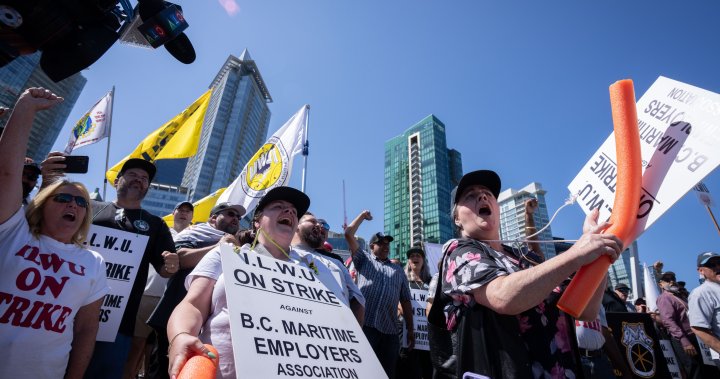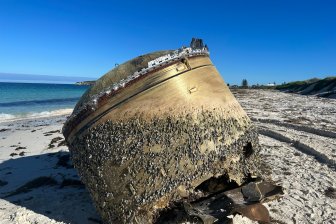British Columbia’s port workers are back on the picket lines.
The offer presented to both the union and employer last Thursday has been rejected and port workers were set to strike again as of 4:30 p.m. Tuesday.
The International Longshore and Warehouse Union Canada and the B.C. Maritime Employers Association first announced a tentative agreement was reached last week, but the employer said the union — representing thousands of port workers — has backed out.
“We regret to advise that ILWU Canada (ILWU) has communicated that ILWU’s internal caucus leadership rejected the tentative agreement, before it was even taken to a vote of the full union membership,” the BCMEA said in a Tuesday statement.
“This fair and comprehensive package could not satisfy some of ILWU internal caucus leadership, and in rejecting this tentative agreement, ILWU Leadership is choosing to further harm Canada’s economy, international reputation and most importantly, to Canadians, their livelihoods and all those that rely on a stable supply chain.”
The employers association said the proposed four-year collective agreement settlement package that was rejected included “considerable hikes in wages and benefits” that exceeded the approximate 10-per-cent increase over the past three years. The proposed increases, it added, were also “generally above the established norm of recent private and public sector union settlements in British Columbia and Canada.”
In a statement, the ILWU said its Canada Longshore Caucus voted down the terms of the settlement.
“The ILWU Canada Longshore Caucus does not believe the recommendations had the ability to protect our jobs now or into the future,” the union said.
“Our position since day one has been to protect our jurisdiction and this position has not changed.
“With the record profits that the BCMEA’s member companies have earned over the last few years the employers have not addressed the cost of living issues that our workers have faced over the last couple of years as all workers have.”
In a written statement, federal Labour Minister Seamus O’Regan’s office said it couldn’t comment on the ratification process until it had recieved formal notice from the involved parties.

In the 13 days that workers were off the job already, the Greater Vancouver Board of Trade estimates $10 billion worth of traded goods have been affected.
Stakeholders were quick to call on Ottawa to step in.
“I don’t think the government has much choice now but to legislate them back, to be honest with you,” said John Corey, president of the Freight Management Association of Canada.
“Thirteen days was bad enough, it’s going to take until October to clear that through the supply chain. And if this goes back on, not only is it going to jam up the supply chain, it makes Canada look like a laughing stock.”
In its own statement, the B.C. Chamber of Commerce said it was “profoundly disappointed” the union had rejected the deal.
“Our port infrastructure is critical to the health and success of our businesses, workers and national economy,” chamber president and CEO Fiona Famulak said.
“The strike had already dragged on too long when the tentative deal was announced last week. With an estimated $9.7 billion of cargo disrupted since July 1, it is untenable for the labour dispute to continue further.”
Famulak said the federal government “needs to use every resource at its disposal” to bring the two sides together and end the strike.
Alberta Premier Danielle Smith, who has been vocal about the labour dispute since it began, posted to Twitter calling for the Liberal government to reconvene parliament and legislate and end to the dispute.
“Albertans and Canadians cannot afford to have hundred of millions of dollars daily in products delayed at these ports,” Smith wrote.
“And the longer this strike continues, the more Canada’s credibility as a reliable trading partner is damaged.”
The strike, affecting about 7,400 workers started on July 1 and lasted 13 days before the offer was presented.
Shipments were halted in and out of about 30 ports in B.C., including Canada’s largest, the Port of Vancouver.
The Greater Vancouver Board of Trade estimated more than $9.3 billion of trade has been disrupted since the strike began on July 1.
More to come.
© 2023 Global News, a division of Corus Entertainment Inc.





